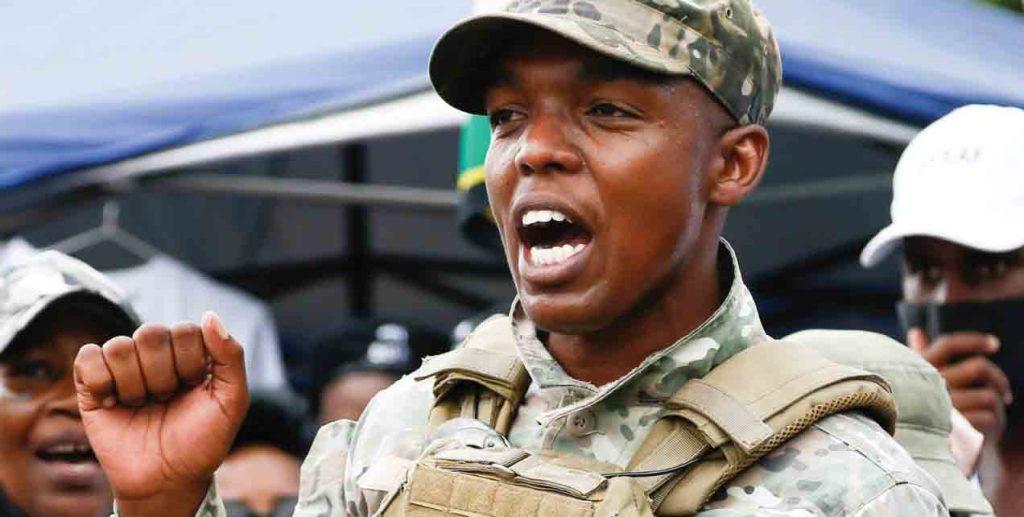Africa-Press – Lesotho. South Africa is straining at the seams as the repercussions of deep inequalities, our inability to bring about structural economic transformation since 1994 and the old baggage of the apartheid years come to haunt us, making the environment ripe for blaming ‘the other’.
Recently, Stats SA released the latest unemployment statistics. They make for sobering reading and represent crisis and tragedy. But in a country with so many serious matters competing for our attention, we blinked and moved on to the next issue.
We cannot afford to do so, however. South Africa’s unemployment rate is now 35.3%, while youth unemployment is a staggering 65.5%. In this context, it is therefore entirely predictable that xenophobia would be fomented in our inner cities, towns and workplaces.
These past weeks we have seen Operation Dudula gaining further prominence on the streets, especially after its leader, Nhlanhla “Lux” Dlamini, (Lux, meaning “light”. Is his task to bring people towards the light or into inevitable darkness?) was arrested.
Operation Dudula has brought with it violent language and has enticed those at the margins of our society with its easy thinking and facile solutions to complex problems of unemployment and inequality.
The intricate links it has forged with certain politicians were almost inevitable. Our inner cities and towns have long been places with discontent simmering at the surface.
Yet, in the typically South African way, we have chosen to ignore the degradation and depravity. We have seen xenophobic violence spread to Johannesburg and further afield at various intervals.
Truck drivers routinely “protest” against the hiring of foreign drivers. We also remember 2008 as a frightening time when the “Burning Man” covered the front pages of local and international newspapers.
Ernesto Nhamuave, a 35-year-old Mozambican, was burnt alive during xenophobic violence on the East Rand in May 2008, violence that spread across the country.
Of course, many in government refused to call it xenophobia. That seemed and often still seems a step too far. In 2015, the streets of Durban and the surrounding townships were seething with anger and violence as foreigners and locals battled it out.
The government finally stepped in to prevent a bloodbath in Durban, yet its response was largely reactive. Then, the late King Goodwill Zwelethini was quoted as saying all foreigners should return to the places they came from.
At the time, the government refused to speak out against these blatantly inciteful comments and the king himself blamed the media for misinterpreting what he said.
Xenophobic comments made by the then minister of water and sanitation, Nomvula Mokonyane, and the then minister of small business development, Lindiwe Zulu, also made headlines at the time.
It was Zulu who said that foreigners were here as a “courtesy”. The two ministers received no sanction for their comments from former president Jacob Zuma. No wonder then that poor, unemployed locals deemed it appropriate to vent their anger on foreigners. Rhetoric matters.
The new district mayor in Beaufort West, Gayton McKenzie has vowed to make the Central Karoo an “illegal immigrant-free zone”, sending shivers down the spines of the Bangladeshi, Pakistani and Ethiopian communities.
As with everything else in South Africa, the reasons for violence are complex. Sometimes it has been driven by xenophobia, at other times a rather more confusing cocktail of anger, frustration and intolerance bubbling at the surface of our society.
Fuelled by exclusion, poverty and rampant unemployment. We seem to be straining at the seams as the repercussions of deep inequalities, our inability to bring about structural economic transformation after 1994 and the old baggage of the apartheid years come to haunt us.
The environment is ripe for blaming “the other” while competing for scarce resources. At the heart of the incendiary rhetoric lies populist exploitation and an instinct to simplify the complex. This is not unique to South Africa. We have seen it in Donald Trump’s presidency and the arguments for Brexit.
We can call on our hapless politicians to “put an end” to the xenophobic violence, rhetoric and disruption that often accompanies these protests, but xenophobia is a challenge for the whole of our society.
Margaret Atwood, in comments made after receiving the sixth annual Hitchens Prize (in honour of the late Christopher Hitchens), put it plainly when she described the challenges to “open democracy” the world faces right now.
Of course, the war in Ukraine, which seems to have no end in sight, was top of mind for Atwood as well as the assault on democracy which was the Trump presidency.
But her words are universally applicable. She argues for reason and against illogic in public life and our interactions with one another. The blame-and-shame game happens when we set aside reason and the ability to unravel complexity.
Instead, we resort to name-calling, putting people in silos — “them” vs “us” and asserting easy answers to complex problems. Someone must be blamed, whether or not the evidence/facts support the argument. This is a threat to science (as we have seen during the Covid-19 pandemic) but also to democracy itself.
Atwood articulates this as follows: “…an ongoing examination of last year’s violent coup attempt in that erstwhile beacon of democracy, the United States — a country in which various parties are now proposing to drag people in front of firing squads, without even a trial, it seems.
Who needs a trial when it is known with absolute certainty who ought to be gunned down? How is it known? A finger has pointed. There is no need for evidence or truth… Something proposed as a truth can, however, be put to the test.
In recent years, people have confused beliefs with truths. From this confusion have come ideologies and dogmas — the characteristic of a dogma being that it’s proposed as an absolute truth and cannot be disputed, and if you try disputing it, you’ll be burned as a heretic.
When we read of Operation Dudula or of Gayton McKenzie’s populist rhetoric and we watch the hunting down of foreigners who are often beaten and labelled and when the logic presented is that “they are taking our jobs”, and when our government responds with policy requiring quotas in the workplace without much thoughtful discussion, then we know that we are entering the territory of simplistic thinking.
And when the government is slow to condemn violence against migrants, then we need to see the blame game that is unfolding and to understand too that such populism is what Atwood speaks of — simple solutions instead of grappling with complexity and, in our case, doing the hard work needed for a growing economy and a dent in the unemployment numbers.
It is easy to lament the state of the world, especially in our country with its often intractable challenges. Yet, Atwood makes the call for putting the shoulder to the proverbial wheel. She says, of our choices, “If it’s open democracy, we’ve got some work ahead of us.
We must roll up our proverbial sleeves, grab our arrows of desire, sharpen the paring knives of our wits, dedicate our swords to the pursuit of truth, strengthen our resolve, resist the serpents of false argument, hop into our chariots of fire.
But desperate times require desperate remedies, and our times are desperate. However, instead of all these chariots and swords, I’ll propose something simpler.
Don’t panic. Think carefully. Write clearly. Act in good faith. Repeat. ” Think carefully. Write clearly. Not a bad mantra for our times where words are so recklessly slung around. DM l Judith February is the executive officer of Freedom Under Law and editor of Judith’s Prudence, the Daily Maverick legal newsletter.
For More News And Analysis About Lesotho Follow Africa-Press






